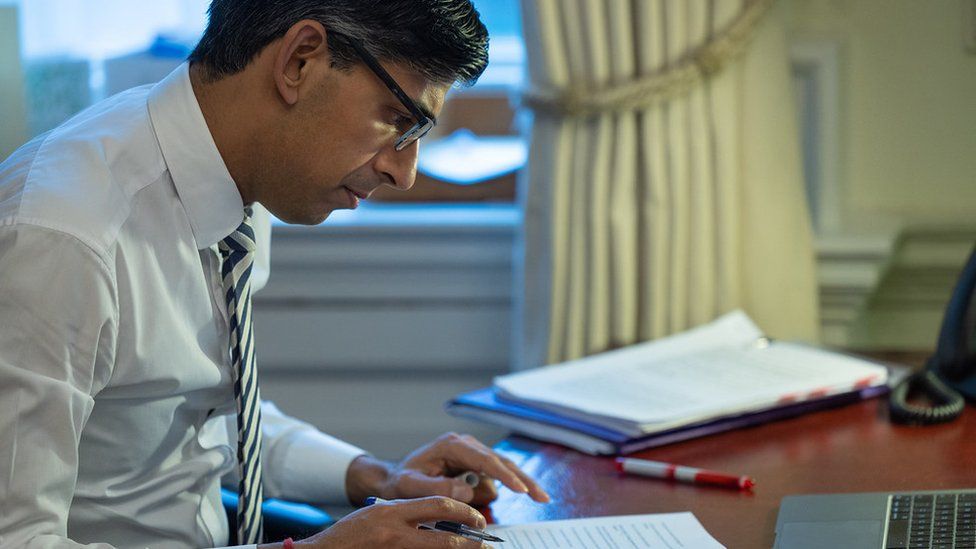
The prime minister is looking at plans to ensure all pupils in England study maths in some form until the age of 18.
Rishi Sunak will announce the aim in his first speech of 2023 later, which he will use to set out his priorities.
Mr Sunak's speech comes amid a winter of multiple strikes, a cost-of-living crisis and huge pressures on the NHS.
He will be keen to use the speech to prove competence and grip, and set forward ideas after the political turmoil of last year.
On Tuesday, No 10 said the government was "confident" it was "providing the NHS with the funding it needs".
During his speech, Mr Sunak is expected to expand on his vision for the UK, and revisit comments made in December about giving people "peace of mind".
The Daily Mail reports that Mr Sunak will take "personal charge of tackling the NHS crisis".
The prime minister is likely to use Wednesday's speech to acknowledge pressures facing the UK's health system, the paper adds.
But opposition parties have accused the prime minister of being "missing in action", as senior doctors warn some accident and emergency units are in a "complete state of crisis".
With the Conservatives trailing in the polls, Mr Sunak will also be keen to set out the aims of his premiership beyond crisis management.

In lines briefed to journalists ahead of the speech, Mr Sunak is expected to say the UK must "reimagine our approach to numeracy".
"In a world where data is everywhere and statistics underpin every job, our children's jobs will require more analytical skills than ever before," he will say.
"And letting our children out into the world without those skills, is letting our children down".
Just half of 16 to 19-year-olds study maths, according to Mr Sunak - but this figure includes pupils doing science courses and those who are already doing compulsory GCSE resits in college.
It is not clear what the plans will mean for students who wish to study humanities or creative arts qualifications, including BTecs and no new qualifications are immediately planned and there are no plans to make A-levels compulsory.
The government is instead exploring expanding existing qualifications as well as "more innovative options," a Downing Street spokesperson said.
The prime minister is expected to begin working on the plan in this parliament and finish it after the next general election.
The Autumn Statement unveiled an extra £2.3bn in core school funding for five to 16-year-olds over the next two years - reversing the real terms cuts of the last decade, but no extra funding was given to further education colleges, which educate many of the most disadvantaged 16 to 18-year-olds, nor to sixth form colleges.
This is compounded by a predicted rise in the 16 to 18-year-old population in the next eight years.
According to the Institute for Fiscal Studies the number of 16 to 18-year-olds is projected to rise by a total of 18% between 2021 and 2030, equivalent to 200,000 extra students.
'Show working'
The Association of School and College Leaders said there was a "chronic national shortage of maths teachers".
And Labour's shadow education secretary Bridget Phillipson called on Mr Sunak to "show his working" on how greater participation in maths will be funded.
"He cannot deliver this reheated, empty pledge without more maths teachers, yet the government has missed their target for new maths teachers year after year," she said.
Liberal Democrat education spokesperson, Munira Wilson, called the aim "an admission of failure from the prime minister on behalf of a Conservative government that has neglected our children's education so badly".
"Too many children are being left behind when it comes to maths, and that happens well before they reach 16," she added.
In 2011, the then education secretary Michael Gove said he would like to see the "vast majority" of pupils in England studying maths to the age of 18 within a decade.
The year ahead
Mr Sunak will also use Wednesday's speech to outline his agenda for the coming months, as the Tories continue to trail Labour in the polls.
He became prime minister towards the end of a turbulent political year which saw his two predecessors - Boris Johnson and Liz Truss - brought down by Conservative backbenchers.
In the coming year, Mr Sunak faces the challenge of keeping his own MPs happy, while dealing with the rising cost of living and strikes in several sectors, including nursing and the rail industry.
In his new year message, he said: "I'm not going to pretend that all our problems will go away in the new year," said Mr Sunak, but added that "the very best of Britain" would be on display as it continues to support Ukraine in its fight against Russia.
Previously Mr Sunak has promised "tough" legislation to clamp down on strikes by setting minimum service levels on railways.
https://news.google.com/__i/rss/rd/articles/CBMiL2h0dHBzOi8vd3d3LmJiYy5jby51ay9uZXdzL3VrLXBvbGl0aWNzLTY0MTU4MTc50gEzaHR0cHM6Ly93d3cuYmJjLmNvLnVrL25ld3MvdWstcG9saXRpY3MtNjQxNTgxNzkuYW1w?oc=5
2023-01-04 08:57:44Z
CBMiL2h0dHBzOi8vd3d3LmJiYy5jby51ay9uZXdzL3VrLXBvbGl0aWNzLTY0MTU4MTc50gEzaHR0cHM6Ly93d3cuYmJjLmNvLnVrL25ld3MvdWstcG9saXRpY3MtNjQxNTgxNzkuYW1w
Tidak ada komentar:
Posting Komentar